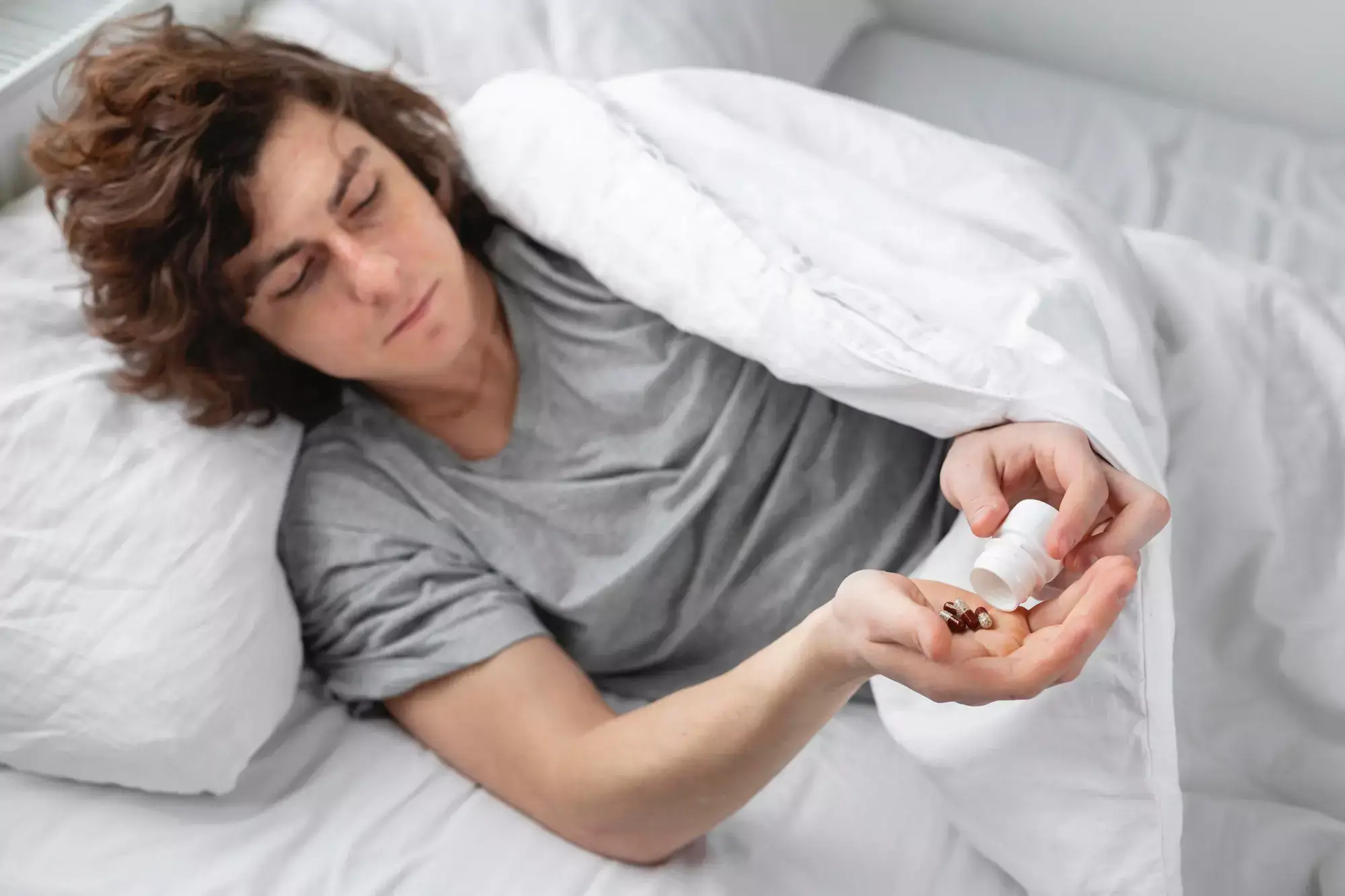Which is Best for Sleeping: Melatonin or Serotonin?

Have you ever found yourself staring at the ceiling in the middle of the night, unable to fall asleep no matter how hard you try? You’re not alone. Countless people face sleep struggles, and many turn to supplements in search of relief. Among the most popular options are melatonin and serotonin.
But when it comes to improving sleep, which is best for sleeping: melatonin or serotonin? Let’s break down the science behind these two and figure out which one might be your sleep solution.
What is melatonin?
Melatonin is often called the "sleep hormone" because it helps control your sleep-wake cycle. It’s produced naturally by the pineal gland in the brain and its levels rise when it gets dark, signaling that it's time to sleep.
In the morning, when light appears, melatonin levels drop, helping you wake up and feel alert. It’s actually your body’s way of keeping track of when it’s time to relax and when it’s time to be awake.
How does melatonin affect sleep?
Melatonin helps your body’s internal clock stay in sync with the world around you. It tells your body when it’s time to sleep and when it’s time to wake up. That’s why people often use melatonin supplements to help with issues like jet lag, shift work, or other disruptions in their sleep schedule.
Research shows that melatonin supplementation can be effective for:
-
Reducing sleep onset latency. This means it can help you fall asleep faster.
-
Increasing total sleep time, which means you stay asleep longer throughout the night.
-
Regulating circadian rhythms, making it easier to maintain a consistent sleep schedule.
What is serotonin?
Serotonin is a neurotransmitter, also known as “feel-good hormone”. It helps regulate mood, appetite, and digestion. Higher levels of serotonin are linked to improved mood and happiness and are therefore important for emotional well-being. In addition, serotonin is also indirectly involved in sleep regulation.
How does serotonin influence sleep?
Serotonin doesn’t directly affect sleep, but it plays an important part in helping you sleep well. It’s actually a building block for melatonin. In the evening, your body converts serotonin into melatonin in the pineal gland, signaling that it’s time to wind down and get ready for sleep. So, having enough serotonin is important for making sure you have enough melatonin to fall asleep.
Low serotonin levels can also affect your mood, leading to issues like anxiety and depression, which are often linked to poor sleep. But serotonin’s role in sleep is a little more complicated. During the day, higher serotonin levels help keep you awake and alert, while at night, lower levels are more connected to sleep.
Studies show that when serotonin levels are too low, it can reduce melatonin production, which may make it harder to sleep and lead to problems like insomnia. So, while serotonin doesn’t put you to sleep directly, it helps set the stage for healthy, restful sleep.
Which is best for sleeping: Melatonin or serotonin?
So, which one should you turn to for better sleep—melatonin or serotonin?
If you’re looking for a quick way to fall asleep or get your sleep schedule back on track, melatonin is a great option. It helps signal your body that it’s time to sleep, especially when your natural melatonin levels are off, such as during jet lag after traveling or working late.
Melatonin works best when you need to reset your body’s internal clock. Evidence suggests that melatonin can help you drift off more quickly and improve your sleep quality, making it an effective solution for temporary sleep difficulties. A review of 23 studies found that melatonin significantly improves sleep quality, especially in people with respiratory, metabolic, and sleep disorders. However, it had less effect on those with mental health or neurodegenerative diseases.
| Remember that the recommended melatonin dosage for adults is 0.5 to 5 milligrams and should be taken two hours before bed. For children, 2 milligrams is considered safe. However, note that excess intake may lead to grogginess and even melatonin poisoning. |
|---|
While serotonin doesn’t directly make you sleepy like melatonin, it’s still an essential player in sleep. Serotonin supports melatonin production, so without it, your sleep cycles could be disrupted. But, serotonin’s role in sleep is a little more subtle and often tied to emotional well-being. A study with 30 older adults found that taking 5-HTP (100 mg daily) helped improve sleep quality, especially for those who had trouble sleeping. After 12 weeks, participants had better sleep scores, higher serotonin levels, and more diversity in their gut bacteria, which is linked to better health.
If your sleep problems are connected to mood disorders, anxiety, or depression, improving serotonin levels could help with sleep over time. Balancing serotonin through lifestyle changes like diet, exercise, or supplements such as 5-HTP (hydroxytryptophan) can lead to better sleep in the long run, though the results may take more time to appear compared to melatonin.
| If you’re thinking of using serotonin-boosting supplements, it’s essential to be cautious. Too much serotonin can lead to side effects like nausea, dizziness, and in rare cases, a dangerous condition called serotonin syndrome. Always consult with a healthcare provider before taking serotonin supplements, especially if you are on other medications. |
|---|
Side effects of melatonin and serotonin
Melatonin and serotonin-boosting supplements are generally safe for short-term use, but they can come with some side effects.
Melatonin side effects
While melatonin is generally safe, it may lead to some side effects, especially if taken in higher doses:
-
Daytime drowsiness
-
Headaches
-
Dizziness
-
Hormonal effects (in high doses)
Serotonin side effects
Serotonin-boosting supplements, like 5-HTP, can also cause:
-
Nausea
-
Upset stomach
-
Drowsiness
-
Increased anxiety (in some cases)
It’s always a smart move to check with your doctor before trying any new supplements, especially if you have health concerns or take other medications. Additionally, since the supplement industry isn't well-regulated, the quality of products can vary, so it’s important to be careful when selecting them.
So, which is best for sleeping?
So, which is best for sleeping: melatonin or serotonin? Both play a role in how we sleep, but melatonin is usually the better option if you're looking to fall asleep faster and improve sleep quality. If your sleep issues are tied to mood problems or anxiety, focusing on serotonin could help over time. However, for more immediate results, melatonin is the more direct choice. As always, it's a good idea to consult with your doctor before starting any new supplements, since everyone's needs can vary.
Plus, set a regular sleep schedule, avoid screens before bed, and keep your room cool and dark. Also, steer clear of heavy meals, caffeine, and alcohol before bed. By following these tips, you can get better, deep sleep.

